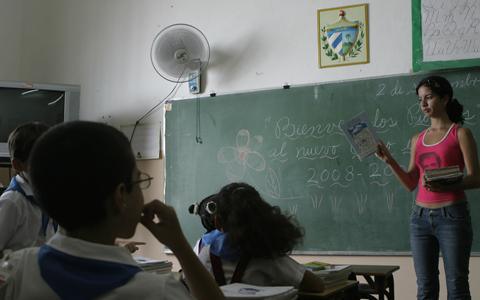Our present work is concentrating on the processes of compulsory purchase (forced expropriation) against the owners of motor vehicles transporting freight from the provinces of Holguín and Las Tunas.
Before they started this, in the extinct transport sectors, they created commissions for the buying and selling of trucks, which followed the express instructions of the Ministry of Transport in regard to inspecting the vehicles in question, to detect anything illegal done by their owners in terms of parts, components, accessories or engine units.
Once they had finished the inspection, they wrote out a report on the deficiencies they had detected; afterwards they gave the owner a document directing him to sell his vehicle, for which they paid by cheque in the payee’s name in national money for the value of $1800 or $2500, depending on the tonnage.
This transaction was covered by an ambiguous, corrupt and one-sided contract of sale authorized by Resolution 118-88 of the Ministry of Transport, the law 1090/63, complemented by the law 1148/64, and the law 1206/67, which entitled the Central Administration entities of the state to acquire the assets required for the taking forward of their activities; giving rise to a situation in which, on the presentation of demands before the Civil and Administrative Chamber of the Provincial Tribunals, the sale was Held to be Null and Void because of the exclusion of the spouse’s interest.
In those cases where the vehicle’s owner refuses to effect the sale, the process of compulsory purchase is commenced; a procedure which is instituted in our legal and constitutional system, ensured both by the Constitution of the Republic in Art. 25 and also in Arts. 425 et seq. of the Law of Civil, Administrative, Employment and Economic Procedure; being the prerequisite which mediates the declaration of public necessity and social interest.
On that basis the Ministry of Transport issued Resolutions number 40 and 85, which declared the public necessity and social interest in acquiring the said vehicles which were operating in the eastern area, in order that the Holguín Truck Company could achieve its transport plans. Looking back, it is clear that the objective of this process was to get rid of the private sector.
This view is backed up by an legal Opinion issued by the legal directorate of the Ministry of Transport, in relation to a complaint presented by truckers from the province of Holguín addressed to Raúl Castro Ruz, who was at that time Second Secretary of the PCC (Communist Party of Cuba) and Minister of the FAR Revolutionary Armed Forces); in which, among other things, there is the following reference: The compulsory purchase of trucks, initiated against their owners, has its antecedents in the year 1989, when, on the orders of the high command of the country they made available what was termed “The policy of making things harder for the private sector, with a view to its gradual disappearance”, reflected in agreement no. 1507 of the Secretariat of the Central Committee of the PCC …
We can therefore conclude that:
Firstly: The private carriers were grouped in the defunct Fleet Operator, from where they offered their transport services, both to private individuals and companies, as well as the Central Administration of the State.
Secondly: That the Ministry of Transport secured, employing anticipated alleged technical violations and by way of a corrupt contract of sale, the compulsory purchase, with no voluntary aspect at all, of private sector trucks, resulting in the later nullification of these legal transactions.
Thirdly: That the State disguised its true intentions, aided by a false declaration of public necessity and social interest, when its real interest was to get rid of the private sector.
Fourthly: Today it remains clear that this sector represents a great public utility and is in the social interest, as the state has had to turn to the private carriers in order to sort out the situation with the transport of passengers and goods on a national level.
Therefore it would be good to get a reply to the question in the title: Compulsory purchase: Why and what for?
Translated by GH
26 August 2013




